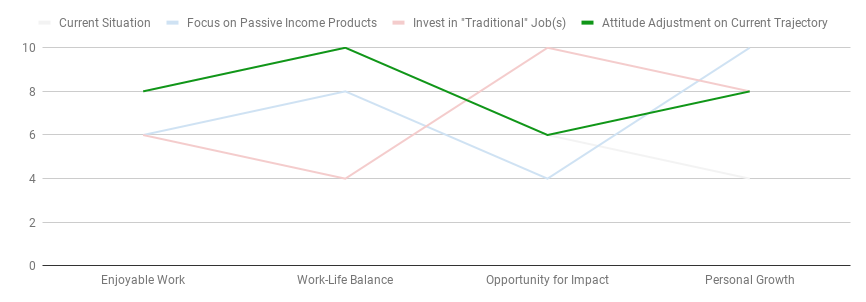Last month I encountered the Japanese concept of Ikigai for the first time.
Meaning “a reason for being”, Ikigai suggests you should do something at the intersection of:
- What you love.
- What you’re good at.
- What you can be paid for.
- What the world needs.

The Ikigai venn diagram. Hat tip to Mckay Wrigley whose tweet introduced me to the concept.
As a framework for choosing what to work on it immediately resonated. And it also immediately clarified something that’s been nagging at the back of my mind for months—maybe even years now.
Why don’t I feel completely content?
I love what I’m doing.
I’m good at it.
And—slowly but surely—I’m getting paid for it.
Ah. But does the world need more place cards? Does it need a Django SaaS boilerplate?
The answer—while not obviously “no”—is certainly not obviously “yes”. These things are fine. Net positive, surely. They help some people, and make lives better in small ways. But I doubt that I’ll proudly write “made it easier to make wedding place cards” on my tombstone.
So there I am, sitting at the intersection of “love”, “good at”, and “paid for” with no “need”.
Satisfaction, but feeling of uselessness.
I couldn’t have said it better myself.
A long history of inaction
The notion of doing something “good”, something “meaningful”, keeps finding its way back into my life. And I keep ignoring it.
In January of 2018, humbled by the book Sapiens and Elon Musk’s biography, I wrote:
My little experiments with place cards and passive income feel pretty silly and small in the context of human history and changing the world like Elon.
I haven’t really figured out what that means for me yet, but I’ve added “passion project” to my high-level goals, because I’d like to be able to try and make a dent in the universe that’s not tied to money.
But, that never really went anywhere.
Five months later, I came up with my own framework for evaluating career choices that focused on four axes: “enjoyment”, “work-life balance”, “impact”, and “personal growth”. Four axes that actually map closely to ikigai—just positioning earning money as a requirement instead of a choice, and adding “work-life balance” to the mix.
Anyway, I chose an option with the lowest score on impact.

The career path I decided to follow—with “impact” a.k.a. “what the world needs” getting the lowest score.
And even as recently as this past July, I explicitly dropped the only goal I had related to bigger picture exploration and non-traditional work—the goal where my “making the world a better place” aspirations resided.
Paralysis by Analysis
Reflecting on why I’ve continually failed to launch on the “do-gooding” front, the best explanation I can come up with is it’s just too damn hard.
First you have to pick a cause. And the world is full of possible causes that one might want to dedicate one’s time to. Just looking at current events in 2020, there’s Covid-19, the US elections, and systemic racism at the forefront.
And zooming out a bit you get even more options. Climate change and environmentalism. Global poverty, health, and inequality. Gender rights. Technology abuse and the manipulation of information. Just to name a few.
And say you miraculously manage to decide on a cause. Then what do you do? What the hell is one software developer/solopreneur going to do that the greatest minds on the planet and billions of dollars haven’t already done? How can a single person possibly make a difference?
So the easiest answer—the answer that I’ve defaulted to, time and time again—is to do nothing.
Any step is better than no step
The first step in solving any problem is recognizing there is one. The second step is to do something, anything, to start addressing it.
I’m reminded of a similar feeling I had when I was first deciding what side-project to try building first. I kept thinking “wow, this is a big commitment, I better make sure I choose very carefully”. But actually, that was wrong. It wasn’t a big commitment. It was just a commitment to try something.
Using an analogy to dating—your first step on any new project is much more like a first date than getting married. Maybe it goes great and you continue on for a while. Or maybe it doesn’t, and you learn something and move on. That first product—Place Card Me—ended up being more like a long-term relationship. But many of my other projects have not.
I need to start dating something, anything, that I think the world might need. And we’ll see where it goes from there.
Ikigai—I haven’t found you yet.
But now I know to keep looking.
p.s. Got any ideas for a competent indie maker who wants to make the world a better place? Hit me up.